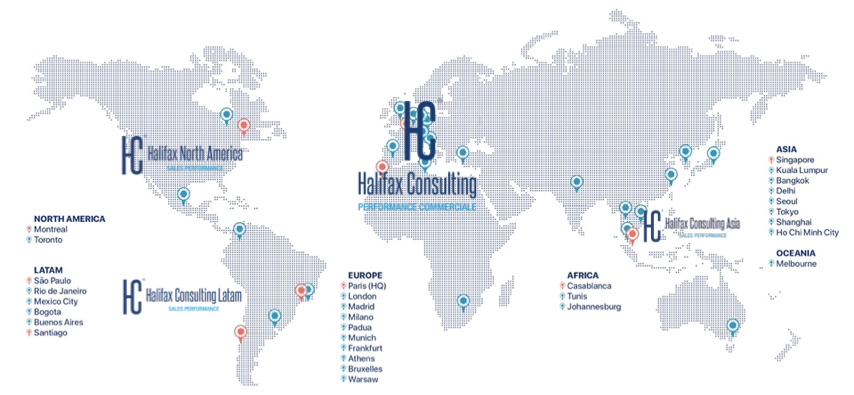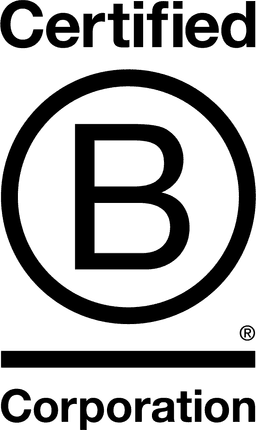

Halifax Consulting North America inc.

1.6
Quebec, Canada
June 2025
Other professional, scientific & tech
Service with Minor Environmental Footprint
Argentina,
Australia,
Belgium,
Brazil,
Canada,
Chile,
China,
Colombia,
France,
Germany,
Greece,
Hong Kong S.A.R.,
India,
Indonesia,
Italy,
Japan,
Lebanon,
Luxembourg,
Mexico,
Morocco,
Norway,
Portugal,
South Africa,
South Korea,
Spain,
Taiwan,
Thailand,
Tunisia,
Turkey,
United Kingdom,
United States
Unleashing the full commercial potential of our clients by aligning teams, processes, and tools to generate sustainable, predictable, and measurable growth. This belief has guided us since 2011 as we support both local and global companies at every stage of their sales transformation journey. We work primarily with B2B companies, supporting clients across five continents, in sectors such as manufacturing, services, and distribution. We deeply understand the unique challenges B Corp companies face: balancing business performance with social impact, scaling responsibly, and aligning teams with purpose. Our mission is to help you build a sales function that reflects your values — and delivers long-term performance. Our Approach Is Built on Three Core Pillars PEOPLE – Engaged, agile, and high-performing leaders and sales teams STRUCTURE – Clear organization, proven processes, and efficient methods TECHNOLOGY – Essential tools to guide, support, and sustain commercial performance We don’t just advise — we help transform. Our clients evolve from informal, unstructured sales efforts to robust, aligned, and high-performing commercial engines that are fully in sync with their culture and mission. Where We Add Value We help our clients: Define clear objectives and build local, national, an
Overall B Impact Score
Governance 16.5
Governance evaluates a company's overall mission, engagement around its social/environmental impact, ethics, and transparency. This section also evaluates the ability of a company to protect their mission and formally consider stakeholders in decision making through their corporate structure (e.g. benefit corporation) or corporate governing documents.
What is this? A company with an Impact Business Model is intentionally designed to create a specific positive outcome for one of its stakeholders - such as workers, community, environment, or customers.
Workers 25.7
Workers evaluates a company’s contributions to its employees’ financial security, health & safety, wellness, career development, and engagement & satisfaction. In addition, this section recognizes business models designed to benefit workers, such as companies that are at least 40% owned by non-executive employees and those that have workforce development programs to support individuals with barriers to employment.
Community 26.9
Community evaluates a company’s engagement with and impact on the communities in which it operates, hires from, and sources from. Topics include diversity, equity & inclusion, economic impact, civic engagement, charitable giving, and supply chain management. In addition, this section recognizes business models that are designed to address specific community-oriented problems, such as poverty alleviation through fair trade sourcing or distribution via microenterprises, producer cooperative models, locally focused economic development, and formal charitable giving commitments.
Environment 6.6
Environment evaluates a company’s overall environmental management practices as well as its impact on the air, climate, water, land, and biodiversity. This includes the direct impact of a company’s operations and, when applicable its supply chain and distribution channels. This section also recognizes companies with environmentally innovative production processes and those that sell products or services that have a positive environmental impact. Some examples might include products and services that create renewable energy, reduce consumption or waste, conserve land or wildlife, provide less toxic alternatives to the market, or educate people about environmental problems.
Customers 4.1
Customers evaluates a company’s stewardship of its customers through the quality of its products and services, ethical marketing, data privacy and security, and feedback channels. In addition, this section recognizes products or services that are designed to address a particular social problem for or through its customers, such as health or educational products, arts & media products, serving underserved customers/clients, and services that improve the social impact of other businesses or organizations.